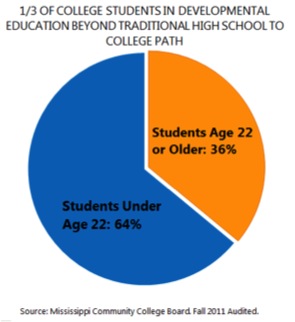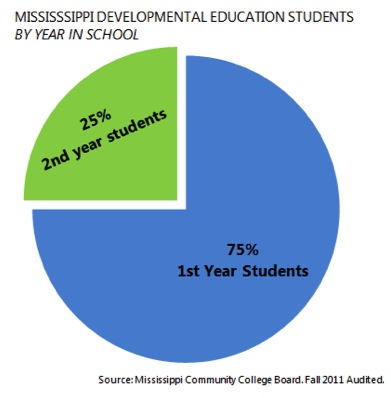What You Need to Know About Developmental Education
January 22nd, 2013
Each year students of all ages enter the doors of Mississippi community colleges with the goal of earning a degree and having better opportunities for quality jobs. Before many of these students can start their college-level coursework, they need remediation in math, english or reading to build their skills. These courses, called developmental education, are critical to giving Mississippians, particularly working adults, a gateway to college completion. The state has the opportunity to move forward with several areas of reform to increase the success rate of students that start in developmental education.
In Mississippi, there is a need to broaden the conversation about developmental education offered at community colleges. Attention needs to focus on improving the outcomes of these students, so they can prepare quickly to take college courses and advance in the workforce.
Removing funding from developmental education or failing to focus on broader reform risks leaving thousands of working adults with fewer paths to a college degree and economic security.
CHARACTERISTICS OF STUDENTS IN DEVELOPMENTAL EDUCATION
Developmental education courses offer a route to college-readiness for over 22,000 of community college students acrossMississippi each year. Statewide 36% of developmental education students are over 21 years old, well beyond the “traditional” high school to college path, and may need academic and non-academic support beyond other students.
Additionally, 1 in 4 students in developmental education are in their second year of college. The relatively large portion of students needing more than one year of remediation
underscores the need to redesign remedial courses,
so students can move to college-readiness faster.
Taking developmental education courses requires additional time and financial resources from students, and as a result,students in remedial courses are particularly at risk of stepping out of school before reaching their educational goals. In Mississippi community colleges, the portion of freshmen starting in remedial courses that graduate within 3 years is 13.3%.¹
IMPROVING OUTCOMES OF STUDENTS STARTING IN DEVELOPMENTAL EDUCATION
Changes to developmental education programs can quickly raise college completion rates and the portion of the state’s workers with a college credential. MEPC’s latest report details 4 priorities for strengthening developmental education programs. The priorities include:
- Improving assessment and placement policies for developmental education;
- Implementing new models of course design that move students through remediation faster or that provide additional occupational content;
- Combining academic and non-academic support services with innovations in course design;
- Collecting additional data to better track the characteristics and evaluate outcomes of developmental education students.
Together, these priorities make up a package of reforms that can boost college completion in Mississippi and have a positive effect on the outcomes of underprepared students. Recognizing the critical need in the state for remedial courses, and the unique needs of many students that enter college through this route is important for the state’s broader educational advancement.
¹Remediation: Higher Education’s Bridge to Nowhere. 2012. Complete College
America. http://www.completecollege.org/docs/CCA-Remediation-final.pdf.







